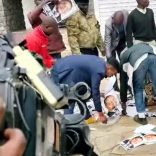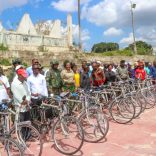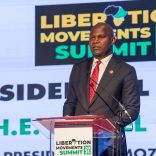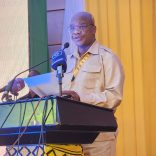Mozambique: Former Renamo guerrillas demand removal of Momade - AIM report
“Militarization of the Mozambican state is a potent threat to peace” – academic

A German historian living in Maputo says the militarization of the Mozambican state is the main threat to peace, warning of the risks of “fascistization” of the political sphere in the country.
“The militarization of the state in recent times is a vehement threat to peace,”, Gerhard Liesegang has told Lusa, arguing that, since his inauguration as president in January 2015, Filipe Nyusi has presented a model of military action that might be an obstacle to the consolidation of democracy.
At a time when the political crisis in Mozambique is aggravated by military confrontations between the defence forces and the armed wing of the main opposition party, Renamo (Mozambique National Resistance), the Eduardo Mondlane University historian notes that Mozambique is developing the “unilateral trend” typical of African dictatorships.
The historian argues that the slim margin of victory achieved by Frelimo, with only 57.03 percent in presidential and 55 percent in parliamentary votes, points to the need to reform the current centralist model if rising political tension is to be avoided.
“It seems to me that there is one group that wants to take care of everything, even the resources, without a more equitable division,” said Liesegang, suggesting the introduction of a more flexible and comprehensive constitutional framework to accommodate the demands of social groups who feel excluded.
For Liesegang, the autonomous provincial authorities proposed by Renamo in 2015 are not “necessarily the solution” to the political crisis, because the economic structure of the country is still fragile and unable to ensure that some provinces survive independently.
“Modern states that have adopted a similar model have shown that the system is very costly, and financially Mozambique would not be able to meet these requirements,” he says, while admitting there is room for debate about updating the constitution.
Liesegang, who has been working in Mozambique since 1969, points out that Samora Machel, Joaquim Chissano and Armando Guebuza, the three heads of state since independence, were aware of the evolution of the problem, but failed to pass their concerns on to the current president.
“In addition to the militarization of the state, I notice that there are some quite insensitive elements, and this is a great danger to peace,” he said.
Highlighting the importance of education in develop a culture of alternating political power, both in society and in the leadership, the Liesegang remarks that the academic community is relatively weak, and says that the country needs academics who are more critical and willing to intervene, and thinkers able to propose solutions to social problems.
“We need a more lively academic community, active and able to provide solutions to our problems,” the deputy director of research and assistant professor maintains. Above all, he adds, political will is essential.
“History is not everything, but it is necessary for people who want to decide the future of a nation to have historical knowledge, political sensitivity and tolerance,” he says, positing an “urgent need to internalize the spirit of peace” in leadership.













Leave a Reply
Be the First to Comment!
You must be logged in to post a comment.
You must be logged in to post a comment.